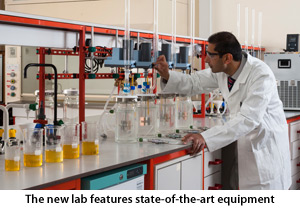Matching up boiler replacement with energy efficiency improvements through the government’s Green Deal scheme has the potential to create new opportunities for the heating industry, but installers aren’t participating and there are some obvious reasons for that.
With this in mind, Baxi is working with policymakers to modify the current system to increase interest and uptake among heating installers.
Baxi believes that both consumers and the market will benefit if a lot more local heating installers can participate in government schemes to help consumers improve the energy efficiency of their homes.
Andrew Keating, marketing director, said:
“Many people have suggested that this low take-up is linked to lack of awareness but our understanding is quite different. In fact, we believe installers look at the costs and complication of the current process, weigh that up with the benefits and make their decision on that basis.
“To validate this suggestion we recently commissioned a focus group, with a large range of installers, to review attitudes towards the Green Deal. Our survey showed that over half believed they understood the initiative, but only eight per cent were already registered Green Deal installers. Only 55% of the remaining installers were considering accreditation.
“The overwhelming response was that having already proven their competency by being Gas Safe registered, and others who have Microgeneration Certification Scheme accreditation for renewable installations, the Green Deal – which requires installers to have the ‘PAS 2030’ quality standard is just another cost to prove their competency.
“More positively, the majority of those we surveyed said they are and would be comfortable offering energy saving advice and installing basic energy efficiency measures, if asked by customers to do so.
“We believe that PAS 2030 as a requirement for Green Deal Installers is a barrier to attracting smaller heating contractors, resulting in a missed opportunity for government and the success of the Green Deal scheme. We understand the premise of the standard to ensure uniformity of installations, but without reform, the Green Deal scheme looks unlikely to attract many local heating installers.
“As local installers are the first port of call for most householders, they hold the relationship, which in turn could benefit them both.
“Our recommendation to policy makers consists of three suggestions. Firstly, they could consider abandoning PAS 2030 as a requirement for heating measures. Alternatively, reform could be achieved by harmonising the requirements for the Green Deal with those under the Affordable Warmth element of the Energy Company Obligation Scheme.
“However our view is that there is benefit for retaining the standards that PAS 2030 has laid out.
“Our preferred option is to provide an exemption for heating engineers on the provision that they undertake some form of training and do not install measures requiring Green Deal Finance. There is strong evidence that customers are paying up front for Green Deal measures to be installed.
“We propose a new category of Green Deal accredited installer who is already part of an approved manufacturer scheme and, therefore, receives regular training. Installers would agree to abide by the Green Deal Code of Practice and the manufacturer would then register the installer with the Green Deal Oversight and Registration Body.”
Andrew continued:
“The main complaint for local heating installers is not the steps laid out within PAS 2030, but the requirement to be assessed and pay certification fees. This new proposal could alleviate this. Most importantly, the majority of the work is administrative and instruction could be easily delivered through manufacturing training schemes, at no extra cost to the installer.
“If it is to find a way to make whole house energy work under the Green Deal, the government cannot afford to miss the opportunity provided by 125,000 heating contractors installing 1.6 million heating systems each year. Likewise, the heating industry should not give up on a huge commercial opportunity, which could deliver significant benefits to its customer base. With this in mind we will continue to work towards change that will, in turn, help local installers enter into the lucrative Green Deal marketplace.”

 B&ES Publications have just launched their newly updated TR/19 ‘Guide to Good Practice – Internal Cleanliness of Ventilation Systems’, included in this are guidance on testing and cleaning of ventilation systems to meet the required standards.
B&ES Publications have just launched their newly updated TR/19 ‘Guide to Good Practice – Internal Cleanliness of Ventilation Systems’, included in this are guidance on testing and cleaning of ventilation systems to meet the required standards.



